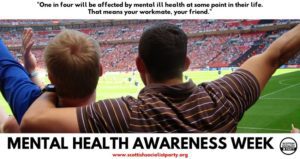by Scott Macdonald
Poor mental health is cruelty. When hurting, we lack the lexicon and awareness to effectively self-critique our own emotional states. We’re very poor at understanding how we grapple, bottle or allow emotions to distort us. So getting it out, among friends and comrades, can help.
My first direct experience of intervening in a friend’s poor mental health was simply one of being there. It was very simple. Getting him to the shops, helping clean the house, him doing the cooking and tending to the physical injuries. There was the prodding, poking and accompanying to the doctor appointments where needed.
 Some may ridicule the language, but when it comes to mental health and comradeship – we can all be personifications of a safe space.
Some may ridicule the language, but when it comes to mental health and comradeship – we can all be personifications of a safe space.
In all cases, I would argue that seeking professional help is absolutely necessary. You’ll find people arguing the efficacy of talking therapies or pharmacological means – I don’t much care, as long as people find the solution that works for them, and don’t give up until it is found.
I’ve never met the person who wasn’t important or had something of value to offer the world in some way or another.
I suffer anxiety. And this manifests itself in attacks. It’s a feeling of sudden and intense anxiety which has physiological symptoms like shaking, feeling disorientated, nausea, rapid, irregular heartbeats, dry mouth, breathlessness, sweating and dizziness. It can happen out of the blue. You could say you’re fine one minute before, then fall to pieces the next.
The last one happened in July 2016 – on the way to a Glitter Against Fascism anti-racist demo. After it happened, I immediately went to the Royal Infirmary. I was treated with understanding and kindness.
I’m now somewhat medicated (a light prescription of Fluoxetine) and have appointments with a counsellor. I was offered some reasonable advice, mostly to take better care of myself in various sensible ways. I intend to follow that advice. And I have others keeping an eye on me – I can’t say “don’t worry about me”, but I do have a support network, and I will use it if I need to.
[x_pullquote type=”right”]Make comradeship and friends into a support role. The last few years have been a bit of a godsend – politics has forced me to come out of an interpersonal stupor. The comrades have been amazing.[/x_pullquote]And that’s the advice I’d offer – to make comradeship and friends into a support role. The last few years have been a bit of a godsend – politics has forced me to come out of an interpersonal stupor. The comrades have been amazing. And I’ve learned, grown and I’ve made more friends in the past four years than in the previous 31. The party has amazing teachers – young and old, who have a breadth of experience and understanding.When I was membership secretary, and shadowing the social media organiser role, one of the things I did – independent of the party’s executive – was to personally keep tabs on where an intervention might be necessary, to see where comrades and friends were finding life hard, beyond day-to-day living. I’d phone or Facebook message them, out of the blue and start a conversation – and finish by offering my number, and saying that they can call at any time if they need to.
I do wonder if that tactic of “here’s my number, call if you need to” is irresponsible (I possess no training or detailed understanding of the mind or pharmacology), rather than an expression of solidarity. Ultimately, I try to listen and make time to be there. I can invite them over, or head over myself for coffee and interpersonal chat. It’s giving them a place to rest and space to get away from it all, than anything I actually say. Often, they tell me it helped.
In Mental Health Week, I remember the friends who suffer, others who have recovered and some who are living much better satisfying lives.
To sum up:
- Look out for yourself. You can’t change the world half as well if you’re suffering.
- Look out for your comrades. Most of them can’t self-improve. And you can’t change the world on your own.
- Make yourself a place of peace and stability – for people who need it.
- Always encourage people who are suffering to seek professional help, and help them see it through.
And be excellent to one another.
Scott Macdonald is the Scottish Socialist Party’s social media organiser.
